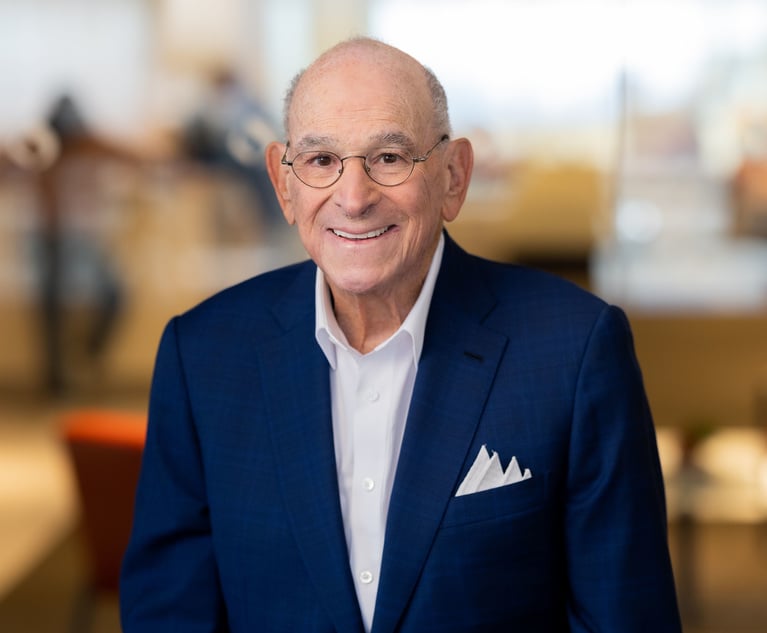 Alka Ramchandani-Raj, employment attorney with Littler Mendelson in San Francisco.
Alka Ramchandani-Raj, employment attorney with Littler Mendelson in San Francisco.Workers' Leave, Sick Pay Among Top Employer Concerns in Age of COVID-19
Littler Mendelson attorney Alka Ramchandani-Raj said the speed and breadth of the coronavirus' impact on the U.S. surprised her. "I don't think anyone expected government officials to issue stay-at-home orders," she said, "nor that the pandemic would create the need for federal legislation."
April 02, 2020 at 04:58 PM
4 minute read
The original version of this story was published on Corporate Counsel
One of employers' biggest concerns these days is figuring out leave and sick pay policies for the workplace under ever-changing federal guidelines, according to a new flash survey.
Nearly 9 out of 10 respondents said they were grappling with whether to pay employees during absences related to the coronavirus, according to Littler Mendelson's COVID-19 Flash Survey Report.
In addition, 85% reported adjusting their sick leave policies or providing additional paid time off, or were considering taking these actions. The mid-March survey asked over 900 international employers based in North America about their virus-related concerns. The participants were primarily in-house counsel or human resources executives.
"A lot of employers don't have plans for pandemics," said Littler's Alka Ramchandani-Raj, a leader of the employment law firm's COVID-19 task force. Employers may normally deal with leave and sick pay on a daily basis, "but when you see it at this level in the pandemic, affecting every single person in the workforce, it creates a significant challenge and very different dynamic," she added.
Ramchandani-Raj, who is based in the San Francisco area, said she receives phone calls and emails every day about COVID-19-related issues, usually from general counsel or human resources professionals but sometimes from CEOs or chief financial officers.
The calls began, she said, in late December and early January from companies that had employees in China. Most involved what to do when employees tested positive either in China or when they returned to the United States.
By Jan. 21, she said the law firm received so many questions that it established a COVID-19 task force to handle the influx. By mid-March, she said she was averaging five calls or emails per minute, and a March 13 webinar she led drew some 5,000 listeners. The law firm was fielding calls around the clock.
As a task force leader, Ramchandani-Raj said she mainly triaged calls, forwarding them to a Littler subject matter expert. When most courts closed, she added, the law firm moved litigators onto the task force to help handle the load. The pace is still demanding, she said, but has eased a little from mid-March.
None of the report's findings surprised Ramchandani-Raj, but the speed and breadth of the coronavirus' impact on the U.S. did. "I don't think anyone expected government officials to issue stay-at-home orders," she said, "nor that the pandemic would create the need for federal legislation."
With the sheer number of government orders and regulations increasing every day, Ramchandani-Raj said, "I am not surprised that employers are having a challenging time."
Melissa Peters, another task force leader, put it this way in a statement, "Companies already facing a patchwork of employee leave laws must now also comply with requirements to provide additional paid leave from measures passed in response to the pandemic. … The current regulatory environment and the novel nature of this virus give rise to several complex and nuanced questions."
Employee morale also arose as a key concern, with many respondents grappling with how to address employee anxiety.
One in-house lawyer mentioned the delicate balance of "giving the right amount of concern and attention without causing panic," the report said.
In other findings, the survey found:
- The need to close offices, factories or stores if an employee or customer tested positive for the virus ranked as the top worry among respondents with 96% expressing concern.
- Some 93% of employers were worried about ensuring that workplace conditions and policies comply with safety and health regulations.
- The most common company steps taken were communicating hygiene practices and prevention measures at 98%, restricting travel at 83% and canceling meetings at 78%.
This content has been archived. It is available through our partners, LexisNexis® and Bloomberg Law.
To view this content, please continue to their sites.
Not a Lexis Subscriber?
Subscribe Now
Not a Bloomberg Law Subscriber?
Subscribe Now
NOT FOR REPRINT
© 2024 ALM Global, LLC, All Rights Reserved. Request academic re-use from www.copyright.com. All other uses, submit a request to [email protected]. For more information visit Asset & Logo Licensing.
You Might Like
View All
These Law Firm Leaders Are Optimistic About 2025, Citing Deal Pipeline, International Business
6 minute read
‘A Force of Nature’: Littler Mendelson Shareholder Michael Lotito Dies At 76
3 minute read
Remembering Am Law 100 Firm Founder and 'Force of Nature' Stephen Cozen
5 minute read
Legal Departments Gripe About Outside Counsel but Rarely Talk to Them
4 minute readLaw Firms Mentioned
Trending Stories
- 1Call for Nominations: Elite Trial Lawyers 2025
- 2Senate Judiciary Dems Release Report on Supreme Court Ethics
- 3Senate Confirms Last 2 of Biden's California Judicial Nominees
- 4Morrison & Foerster Doles Out Year-End and Special Bonuses, Raises Base Compensation for Associates
- 5Tom Girardi to Surrender to Federal Authorities on Jan. 7
Who Got The Work
Michael G. Bongiorno, Andrew Scott Dulberg and Elizabeth E. Driscoll from Wilmer Cutler Pickering Hale and Dorr have stepped in to represent Symbotic Inc., an A.I.-enabled technology platform that focuses on increasing supply chain efficiency, and other defendants in a pending shareholder derivative lawsuit. The case, filed Oct. 2 in Massachusetts District Court by the Brown Law Firm on behalf of Stephen Austen, accuses certain officers and directors of misleading investors in regard to Symbotic's potential for margin growth by failing to disclose that the company was not equipped to timely deploy its systems or manage expenses through project delays. The case, assigned to U.S. District Judge Nathaniel M. Gorton, is 1:24-cv-12522, Austen v. Cohen et al.
Who Got The Work
Edmund Polubinski and Marie Killmond of Davis Polk & Wardwell have entered appearances for data platform software development company MongoDB and other defendants in a pending shareholder derivative lawsuit. The action, filed Oct. 7 in New York Southern District Court by the Brown Law Firm, accuses the company's directors and/or officers of falsely expressing confidence in the company’s restructuring of its sales incentive plan and downplaying the severity of decreases in its upfront commitments. The case is 1:24-cv-07594, Roy v. Ittycheria et al.
Who Got The Work
Amy O. Bruchs and Kurt F. Ellison of Michael Best & Friedrich have entered appearances for Epic Systems Corp. in a pending employment discrimination lawsuit. The suit was filed Sept. 7 in Wisconsin Western District Court by Levine Eisberner LLC and Siri & Glimstad on behalf of a project manager who claims that he was wrongfully terminated after applying for a religious exemption to the defendant's COVID-19 vaccine mandate. The case, assigned to U.S. Magistrate Judge Anita Marie Boor, is 3:24-cv-00630, Secker, Nathan v. Epic Systems Corporation.
Who Got The Work
David X. Sullivan, Thomas J. Finn and Gregory A. Hall from McCarter & English have entered appearances for Sunrun Installation Services in a pending civil rights lawsuit. The complaint was filed Sept. 4 in Connecticut District Court by attorney Robert M. Berke on behalf of former employee George Edward Steins, who was arrested and charged with employing an unregistered home improvement salesperson. The complaint alleges that had Sunrun informed the Connecticut Department of Consumer Protection that the plaintiff's employment had ended in 2017 and that he no longer held Sunrun's home improvement contractor license, he would not have been hit with charges, which were dismissed in May 2024. The case, assigned to U.S. District Judge Jeffrey A. Meyer, is 3:24-cv-01423, Steins v. Sunrun, Inc. et al.
Who Got The Work
Greenberg Traurig shareholder Joshua L. Raskin has entered an appearance for boohoo.com UK Ltd. in a pending patent infringement lawsuit. The suit, filed Sept. 3 in Texas Eastern District Court by Rozier Hardt McDonough on behalf of Alto Dynamics, asserts five patents related to an online shopping platform. The case, assigned to U.S. District Judge Rodney Gilstrap, is 2:24-cv-00719, Alto Dynamics, LLC v. boohoo.com UK Limited.
Featured Firms
Law Offices of Gary Martin Hays & Associates, P.C.
(470) 294-1674
Law Offices of Mark E. Salomone
(857) 444-6468
Smith & Hassler
(713) 739-1250








